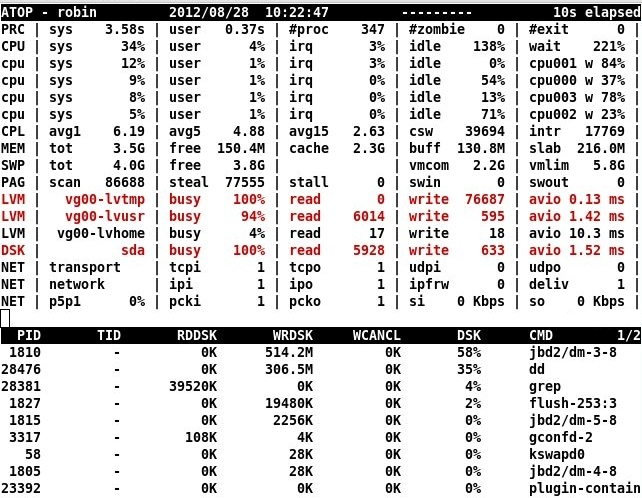Compare htop and atop
htop is interactive process-viewer and process-manager for Linux and Unix-like operating system based on ncurses. If you take top and put it on steroids, you get htop.
atop is a full-screen performance monitor for viewing system load. It shows the most critical hardware resources such as CPU, memory, disk and network. By default, it refreshes every 10 seconds.
Let's see how htop and atop compare on various factors and features.
htop
atop
Overall
Type
Type
Interactive system-monitor, process-viewer and process-manager
Type
Interactive system-monitor, process-viewer and process-manager
Operating System
Operating System
Linux distributions, macOS
Operating System
Linux distributions, macOS
Installation
Installation
Doesn't come preinstalled on most Linux distros. Manual installation is needed
Installation
Doesn't come preinstalled on most Linux distros. Manual installation is needed
Release Date
Release Date
2004
Release Date
2001
License
License
GNU General Public License (GPL-2.0)
License
GNU General Public License (GPL-2.0)
Features
User Interface
User Interface

Colorful and nicer text-graphics interface
User Interface

Text based monochrome interface with the exception of highlighting critical resources in colors. Columns are shown based on the size of the window. Columns are dynamically added or removed as you enlarge or shrink the window.
Scrolling Support
Scrolling Support
Yes, supports horizontal and vertical scrolling
Scrolling Support
N/A
Mouse Support
Mouse Support
Yes
Mouse Support
No
Process utilization
Process utilization
Yes, including user and kernel threads
Process utilization
Yes, shows all processes and threads.
Network Utilization
Network Utilization
No
Network Utilization
Yes
Disk Utilization
Disk Utilization
No
Disk Utilization
Yes
Comments
Comments
Easier to use and supports vi like searching with `/`. Sending messages to processes (kill, renice) is easier and doesn't require typing in the process number like top. Personally, it is my favorite tool.
Comments
It is capable of reporting the activity of all processes (even if processes have finished during the interval), daily logging of system and process activity which can be collected and analyzed later.
Did we miss anything? Do you agree with the comparison? Please share your opinion or feedback below to help others. Thanks.



